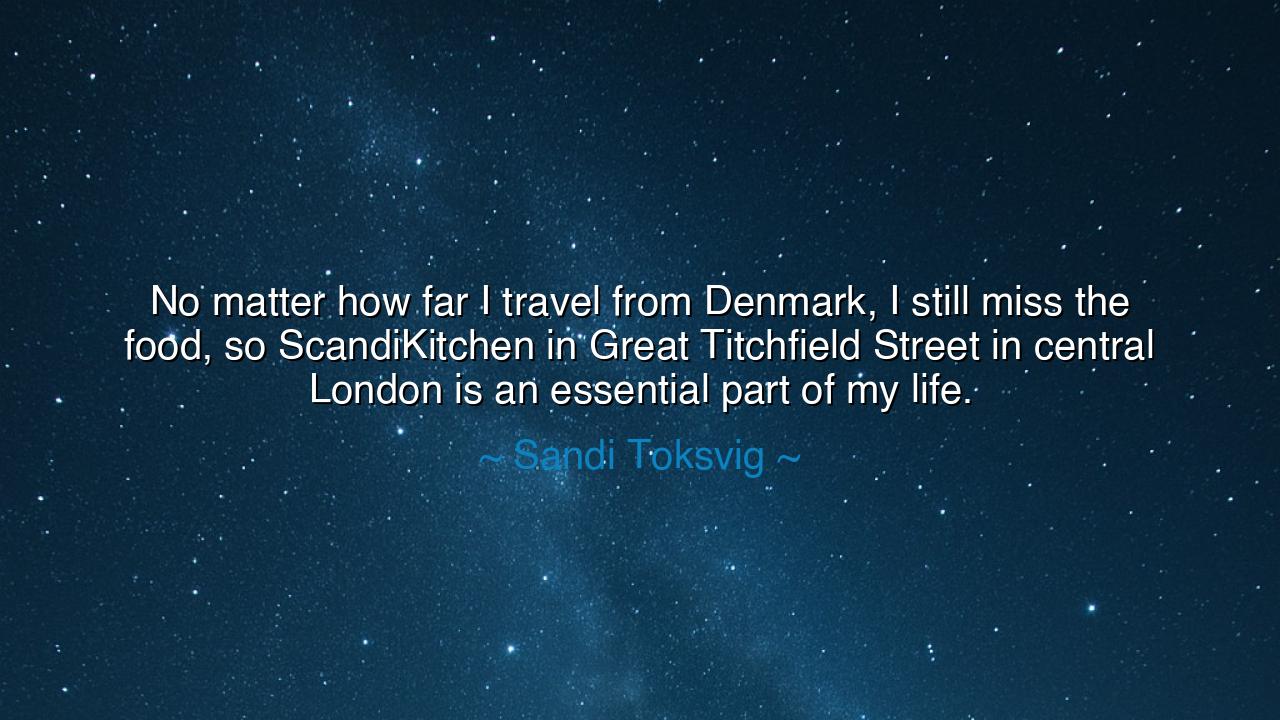
No matter how far I travel from Denmark, I still miss the food
No matter how far I travel from Denmark, I still miss the food, so ScandiKitchen in Great Titchfield Street in central London is an essential part of my life.






Hear the words of Sandi Toksvig, who declared: “No matter how far I travel from Denmark, I still miss the food, so ScandiKitchen in Great Titchfield Street in central London is an essential part of my life.” At first, these words appear lighthearted, a reflection on bread, pastries, and flavors of home. Yet within them lies an eternal truth: that the taste of one’s homeland is more than nourishment for the body—it is nourishment for the soul. Food is memory, food is belonging, food is identity carried within us wherever we wander.
The longing for food from home is a longing for home itself. It is not the rye bread, the herrings, or the pastries alone that Toksvig misses, but the warmth of family tables, the familiarity of childhood meals, the essence of Denmark that lives in its flavors. For every dish carries a people’s history—the soil that grew it, the hands that prepared it, the seasons that shaped it. Thus, when distance stretches between homeland and traveler, food becomes the simplest and deepest way to return.
This yearning is as old as exile itself. Consider the story of the Israelites in the wilderness, who, though freed from bondage, wept for the cucumbers, melons, and leeks of Egypt. It was not simply hunger but the ache for familiarity, for the taste of what once anchored them. Or recall Marco Polo, who, though dazzled by spices of the East, longed for the bread and wine of his native Venice. In every age, the traveler discovers that the heart, though it may marvel at distant wonders, still longs for the comfort of its own table.
The mention of ScandiKitchen in London is more than a note of convenience. It is a sanctuary, a bridge across distance, a place where Denmark lives on in foreign soil. Such places become temples for the traveler, where culture is preserved, and memory is refreshed. For just as migrants carried seeds and recipes across oceans, planting pieces of their homelands in new lands, so too do modern kitchens in foreign streets serve as altars of identity. They remind us that one can live abroad and still taste home.
The deeper meaning of Toksvig’s words is this: that identity is never abandoned, even when geography changes. We may travel far, but the soul does not forget its roots. The foods we long for are not luxuries, but vessels of memory, of belonging, of self. They keep us tethered to our story, reminding us who we are when the world around us is foreign. To miss one’s food is to confess one’s love for one’s land, for the flavors are the poetry of the soil itself.
History shows the power of such longing. When Irish immigrants came to America during the great famine, they brought with them potatoes, soda bread, and stews. Though their lives changed, their foods preserved their heritage. Similarly, Italian pasta, Chinese noodles, Indian spices—each spread across the globe, not only as cuisine, but as identity carried by those who could not bear to let go of their homeland’s taste. Food has always been the anchor of memory.
The lesson for us is clear: never despise the small rituals that tie you to your origin. If you live far from home, honor your longing by cooking the dishes of your people, by finding the places where your heritage is preserved. If you welcome strangers into your land, share food with them, for in sharing food, you share belonging. And when you travel, do not only eat to fill your stomach—eat to understand, to connect, to remember.
Therefore, children of tomorrow, heed the wisdom of Sandi Toksvig: no matter how far you roam, your roots will call to you, often in the form of simple bread or familiar spices. Do not silence that call, but embrace it, for it keeps you whole. For food is not only sustenance—it is memory, it is identity, and it is love made edible. Guard it, cherish it, and let it remind you always of where you come from, even as you journey into the world beyond.






AAdministratorAdministrator
Welcome, honored guests. Please leave a comment, we will respond soon